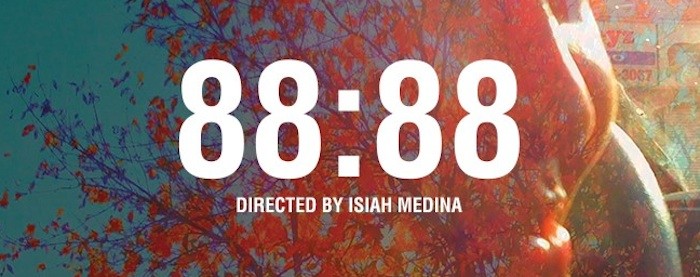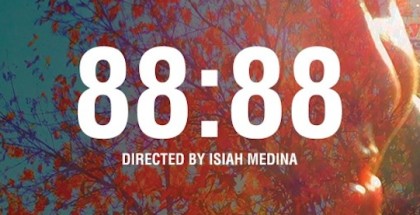VOD film review: 88:88
David Farnor | On 19, Mar 2016
Director: Isiah Medina
Certificate: TBC
Watch 88:88 online in the UK: Not currently available on VOD
The word “experimental” isn’t necessarily one that brings people running in hordes to see a film. It conjures up images of an art installation, an incomprehensible narrative or a barrage of bewildering images. Isiah Medina’s 88:88 is all of those things, for better or worse – and unashamedly so.
The film, which marks the director’s feature debut, isn’t a movie that can be summed up in a sentence, or even a paragraph. It’s perhaps not something that can be put into words at all – despite the fact that it’s stuffed full of them.
“Fuck rare optics, I want rare objects,” says one character, who, like all of the faces we see, remains nameless. Those kind of rhymes are present everywhere. “Nothing to infer but inferno,” we hear over and over again. “No justice, just us,” adds another.
That constant stream of lyrical phrases sets the tone for the piece, which feels more like a poem than what might be deemed “a film” – verse that, despite its lack of a clear plot, manages to raise questions about time, knowledge, life and poverty. Not bad going for something that’s barely an hour long by a guy who’s only recently turned 20.
That youthful energy and angry urgency flow into the film’s form as well as its content – over the 65 minutes, frames fly past like they’re going out of fashion, cut together so quickly that you don’t always have the time to piece together the connections between each one. The sound, too, jumps in and out, leaving you uncertain of what and who is speaking.
“I looked at a clock, but there were no numbers, just 8s behind it and it was like –” says one voice, before being cut off – and, as we see more of the downtrodden downtown of Winnipeg, there’s a growing sense that the title is no coincidence, referring to both power cuts (we presume, due to unpaid bills) and the timeless limbo of poverty. One person compares being homeless to being “relegated to an animal”, while others talk about their lost trust in infinity.
Philosophical discussions are omnipresent, often echoed and continued by a hushed whisper of a narration, but it’s because our young subjects are actually having those conversations – they are, we infer, actively working out their lives at the bottom of the heap.
“In fatalism, there’s nothing else to see except suspension, suspension from chance, but you don’t know how or what that form of suspension and eternal necessity will take,” says one. “I don’t even know,” says another, “it’s all such a blur at this point.”
You know how they feel, but the lack of clarity doesn’t feel intentionally opaque, but rather, unabashed in its attempt to try new things, even if those aren’t always successful.
There’s a political undercurrent to the voice that emerges, one unafraid to up-end the cinematic conventions we’re used to seeing. (The result is reminiscent of Godard’s Goodbye to Language, which felt similarly radical and fresh.) One sequence sees a plane fly along the bottom of the screen, from left to right, but the camera moves so it looks like the craft is sliding backwards and down – a confusing, alien sight. That undercurrent only gets stronger, as we hear talk of Canadian firearms licences and see shots of empty shop shelves, not to mention one striking juxtaposition of a young man in handcuffs against the shiny glass backdrop of the city’s financial quarter.
Some will compare this rhythmic montage to hip-hop music or something else that young people are perceived to listen to at the lower end of society, but there’s never been a line between music and film, just as there’s no line between genres – there are just artists who are willing to ignore the lines that other people see. As 88:88 jumps all over the creative map, there’s never any frustration of a filmmaker withholding meaning or of overwrought pretention; instead, there’s the excitement of seeing someone eagerly assembling their ideas, point by point. “Are you still gathering yourself up?” someone asks, as the film reaches its conclusion. The word “experimental” is an understatement to describe 88:88 – mostly in a good way.

















